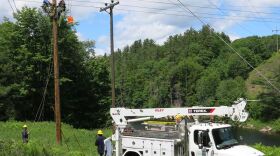About seven percent of New Hampshire’s residents don’t have access to broadband. But in Coos County that jumps to about 31 percent. That's the worst - by a narrow margin - in the state, according to a new study by the University of New Hampshire.
And much of Coos – which has about 33,000 residents – has no broadband access because the technology is typically offered in the southernmost and most populated part of the county.
“There was a clear pattern of having all of the served parts of Coos in the southern tier of the county and the entire central and northern part of Coos County not meeting the FCC definition of broadband service,” said Fay Rubin, a UNH researcher who worked on the study.
That definition is a minimum download speed of 25 megabits per second. The minimum upload speed is three megabits per second.
The central and northern part of Coos may have access to the internet, Rubin said, but it isn’t fast enough for many uses, including some businesses.
The problem, she says, is that internet providers don’t see a profit in the most rural areas because there are so few people and businesses.
That puts residents - including students - and businesses at a disadvantage, the UNH researchers concluded.
For businesses broadband "helps improve efficiency, expand markets, reduce costs and increase revenues," the report says.
And, it is "an important tool for education."
But, the state has not set aside any money to encourage broadband in areas that commercial firms shun, says Carol Miller, an official the the Department of Resources and Economic Development.
Coos was not alone in this problem. The second worst county was Cheshire, where about 30 percent of the residents do not have access to broadband.
The best was Rockingham, where less than one percent didn't have access to broadband.
The preliminary study was based on FCC information collected from internet providers at the end of 2014. The final version of the UNH report is expected at the end of June.
The project was done by UNH’s New Hampshire Broadband Mapping & Planning Program. It was partially financed by theNorthern Border Regional Commission.







